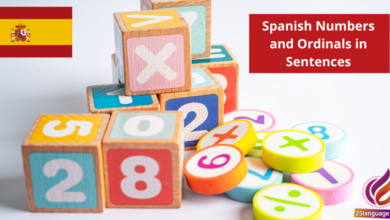Spanish Interrogatives and Asking Questions

Curiosity drives us to learn, and asking questions is the key to unlocking new knowledge! In today’s lesson on Spanish interrogatives, you’ll discover how to form questions that will help you engage in meaningful conversations and deepen your understanding of the spanish language. From simple inquiries to complex phrases, mastering these interrogatives will empower you to connect with native speakers and explore the rich tapestry of Spanish culture. Let’s dive in!
exploring Spanish Interrogatives: Mastering the Art of Asking Questions
In spanish, forming questions often relies on the correct use of interrogative words, which serve as the foundation for asking both simple and complex queries. Key interrogative words include:
- Qué – What
- Quién – Who
- Cuál – Which
- Dónde – Where
- Cuándo – When
- Por qué – Why
- Cómo – How
For example, to ask “What is your name?” you would say ¿Cómo te llamas?. Another example is “Where are you going?” which translates to ¿Dónde vas?. It’s importent to note that in Spanish, the structure of a question often involves inversion of the subject and verb, particularly with yes/no questions. As a notable example, “You are studying?” is expressed as ¿Estás estudiando? rather of the declarative “You are studying.”
| Spanish Example | Interrogative Word | English Translation |
|---|---|---|
| ¿Qué es eso? | Qué | what is that? |
| ¿Quién es ella? | Quién | Who is she? |
| ¿Cuál prefieres? | cuál | Which do you prefer? |
| ¿Dónde está el baño? | Dónde | Where is the bathroom? |
| ¿Cuándo llegas? | Cuándo | When do you arrive? |
| ¿Por qué estudias español? | Por qué | Why are you studying Spanish? |
| ¿Cómo estás? | Cómo | How are you? |
Unlocking the Secrets of Spanish Questions: A Comprehensive Guide
Understanding how to form questions in Spanish is essential for effective communication. Questions in Spanish can be categorized primarily into closed questions (which can be answered with a simple ‘yes’ or ‘no’) and open questions (which require more detailed responses). Closed questions often begin with verbs or question words such as ‘¿Es?’ (Is it?), ‘¿Tienes?’ (Do you have?), or ‘¿Comes?’ (Do you eat?). In contrast, open questions typically start with interrogative words, such as:
- ¿Qué? (What?)
- ¿Quién? (Who?)
- ¿Dónde? (Where?)
- ¿Cuándo? (When?)
- ¿Por qué? (Why?)
- ¿Cómo? (How?)
such as, a closed question would be: ¿Tienes un perro? (Do you have a dog?), while an open question could be: ¿qué haces después de la escuela? (What do you do after school?). It’s important to note that in Spanish, the intonation also plays a role in signaling that a statement is a question. additionally, the inversion of the subject and verb can help form interrogative structures: ¿Vas tú al cine? (Are you going to the movies?) changes the typical order of subject and verb.
| Spanish Example | Type of Question | English Translation |
|---|---|---|
| ¿Es tu hermano estudiante? | Closed | Is your brother a student? |
| ¿Cómo te sientes hoy? | Open | How do you feel today? |
| ¿Dónde están mis llaves? | Open | Where are my keys? |
| ¿Quieres comer pizza? | Closed | Do you wont to eat pizza? |
Navigating Spanish Interrogatives: Effective Strategies for Inquiry
In Spanish, interrogative words are essential tools for forming questions and engaging in conversation. Understanding how to use these words effectively can greatly enhance your communication skills.Key interrogative words include:
- ¿Qué? (What?)
- ¿Quién? (Who?)
- ¿Dónde? (Where?)
- ¿Cuándo? (When?)
- ¿Por qué? (Why?)
- ¿Cómo? (How?)
- ¿Cuál? (Which?)
When forming a question with these words, remember that thay typically come at the beginning of the sentence. For example:
- ¿Qué quieres comer? (What do you want to eat?)
- ¿Quién es tu profesor? (Who is your teacher?)
- ¿Dónde vives? (Where do you live?)
| Spanish Example | Interrogative Word | English Translation |
|---|---|---|
| ¿Cuándo es la fiesta? | ¿Cuándo? | when is the party? |
| ¿Por qué estudias español? | ¿Por qué? | Why do you study Spanish? |
| ¿Cómo llego a la estación? | ¿Cómo? | How do I get to the station? |
| ¿Cuál es tu color favorito? | ¿Cuál? | which is your favorite color? |
Enhancing Communication in Spanish: Practical Tips for Question Formation
To form questions in Spanish, it is indeed essential to understand the structure and necessary punctuation. Questions in Spanish generally begin with an inverted question mark (¿) and end with a regular question mark (?). The basic structure can mirror English in terms of subject-verb-object; though, Spanish possesses unique verb conjugations that vary by subject. For example, if you want to ask “Are you happy?” in Spanish, you would say ¿Estás feliz?, where estás is the second-person singular form of the verb estar (to be). Key points to remember include:
- Invert the order of subject and verb in questions.
- Use appropriate verb conjugation for the subject.
- Begin with an inverted question mark and end with a regular question mark.
When constructing more complex questions, question words play a vital role. These include qué (what), dónde (where), cuándo (when), por qué (why), and cómo (how). Such as, to ask “Where are you going?” in Spanish, you would say ¿Dónde vas?, where vas is the second-person singular form of ir (to go). Additionally, it is important to note that question words always come at the beginning of the question, trailing the inverted question mark. Below is a table summarizing some common question structures:
| spanish Example | Question Word | English Translation |
|---|---|---|
| ¿Qué quieres comer? | Qué | What do you want to eat? |
| ¿Dónde está la estación? | Dónde | Where is the station? |
| ¿Cuándo es tu cumpleaños? | cuándo | When is your birthday? |
| ¿Por qué estudias español? | por qué | Why are you studying Spanish? |
| ¿Cómo llego a tu casa? | Cómo | How do I get to your house? |
Closing Remarks
Conclusión de la lección: Interrogativos en español – Haciendo preguntas
¡Felicidades por haber completado esta lección sobre los interrogativos en español! Hoy hemos explorado las herramientas esenciales para formular preguntas, desde los básicos como “¿qué?”, “¿dónde?”, “¿cuándo?” y “¿por qué?”, hasta otros más complejos como “¿cuál?” y “¿quién?”. Aprender a hacer preguntas es fundamental para establecer una comunicación efectiva y enriquecer tus interacciones en español.
Recuerda que la práctica es clave. Te animamos a que comiences a incorporar los interrogativos en tu vida diaria. Puedes hacer preguntas simples a tus amigos, familiares o incluso en tus conversaciones en línea. No dudes en utilizar los interroggativos para explorar más sobre la cultura hispana, las tradiciones y las experiencias de los hispanohablantes.
Cuanto más practiques, más cómodo te sentirás usando el español. No te desanimes si al principio te resulta un poco desafiante; cada pregunta que hagas es un paso más hacia la fluidez. ¡Sigue adelante! Tu esfuerzo te llevará a grandes logros en tu viaje de aprendizaje del español. ¡Hasta la próxima lección!





























